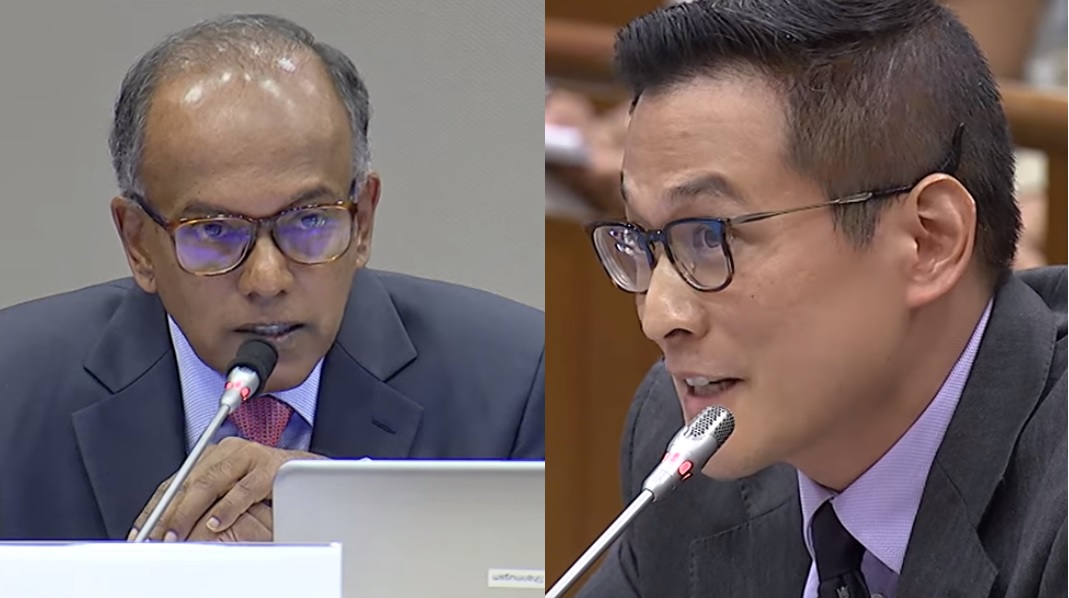In future, a term will be added to the Singapore political lexicon.
Shanmugamed: v. To demolish (an argument or someone) completely, through aggressive questioning in great detail for hours.
To fully understand why Law and Home Affairs Minister K Shanmugam spent close to six hours questioning historian Thum Ping Tjin, you must first read Thum's submission to the Select Committee on Deliberate Online Falsehoods, which he shared on Medium. More importantly, you should pay attention to this part of his submission:
There is clear source of “fake news” which has spread falsehoods, with major impact, and hitherto escaped sanction. That is the politicians of Singapore’s People’s Action Party. The major examples of this are the numerous detentions under the Internal Security Act (ISA, and its predecessor, the Preservation of Public Security Ordinance) from 1963 to 1987. Beginning with Operation Coldstore in 1963, politicians have told Singaporeans that people were being detained without trial on national security grounds due to involvement with radical communist conspiracies to subvert the state. Declassified documents have proven this to be a lie.
Emphasis ours
So there are two things that Thum has put forth:
- PAP politicians have spread falsehoods in relation to events like Operation Coldstore
- Thum said that declassified documents refutes the establishment's stance that people detained under Operation Coldstore were involved in communist conspiracies to subvert the state
He reiterated this point on his Facebook page:
So who is Thum?
Thum is a visiting fellow in History Anthropology and the full-time Coordinator of Project Southeast Asia at the University of Oxford.
Thum has earned a reputation since 2006, when he started publishing on Singapore history, for coming up with counter narratives about how Singapore came to be through his own reading of historical documents.
Thum had submitted his written report to the Select Committee and was looking forward to the hearing.
The Shanmugaming
The purpose of being invited to speak at the Select Committee hearing was to present oral evidence. With Thum declaring that PAP politicians were a "clear source" of "fake news", he would have to present evidence to back up his claim to the committee - which of course includes lawyer-by-training Shanmugam.
The crux of the six-hour exchange was this - Thum had to prove there was no communist conspiracy to overthrow the Government in Singapore, and hence substantiate his point that PAP politicians spread fake news, and Shanmugam, as part of the Select Committee, had to make sure Thum's assertions were rock solid.
The exchange saw Shanmugam asking Thum why he left out evidence by prominent communist leaders which would at least have raised the possibility of a communist plot to overthrow the Singapore Government. Thum said that he "can't possibly account for every single source that ever existed anywhere" and his focus was on "making a coherent argument and proving (his) arguments."
The official videos of the hearing, totalling more than 5 hours of footage, have been released in four parts (here, here, here and here).
Really, you should do yourself the favour and watch the whole thing to come to your own conclusions.
If you have better things to do, here are the highlights:
The highlights of the exchange between Thum and Shamugam
Thum looking handsome here. But...
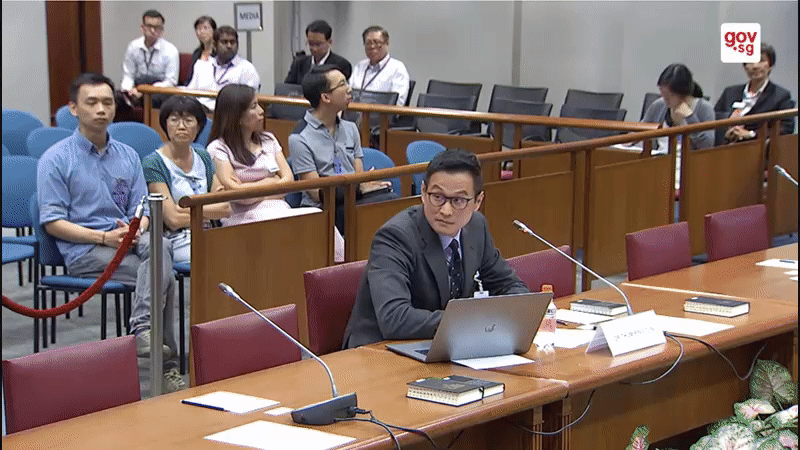 Source: Gov.sg.
Source: Gov.sg.
Right off the bat, he had to admit that he was a research fellow in Anthropology, and not History, as he had indicated in his report to the Select Committee.
And he was also not a tenured member. He later clarified to a Facebook posting that he is a "visiting fellow in history within the dept of anthropology."
Excerpts of Exchange 1: Thum cracking a joke on free speech
PJ: Mr Shanmugam, I’m aware of all of this. This is in the historical record. Are you getting somewhere with this question?
Shanmugam: I will, let’s have some ground rules. We ask the questions. We refer you to such materials as we think is relevant. You try not to interrupt when the question is being asked. And then you answer the question that is asked.?
Shanmugam: I will, let’s have some ground rules. We ask the questions. We refer you to such materials as we think is relevant. You try not to interrupt when the question is being asked. And then you answer the question that is asked.
PJ: Gosh, no one gets to answer the question to ask a question in Singapore, do they?
Shan: Have you been stopped from answering any questions in Singapore?
PJ: No, I was just making a joke. Thank you.
Shanmugam: I would ask that you avoid jokes here and treat the proceedings seriously. And if you do want to make a joke, try to have some truth to it.
PJ: Oh, truth is very important to me.
Shamugam: Yes, we will see about that in a while.
PJ: Yes, we will.
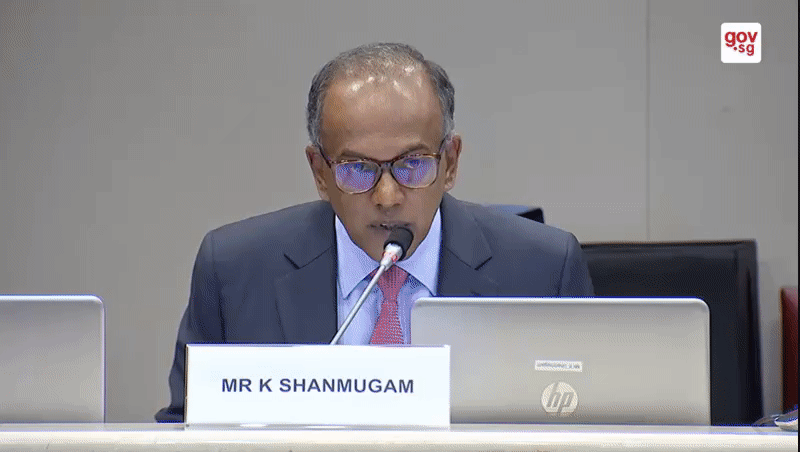 Source: Gov.sg YouTube.
Source: Gov.sg YouTube.
PJ Thum after 1 hour
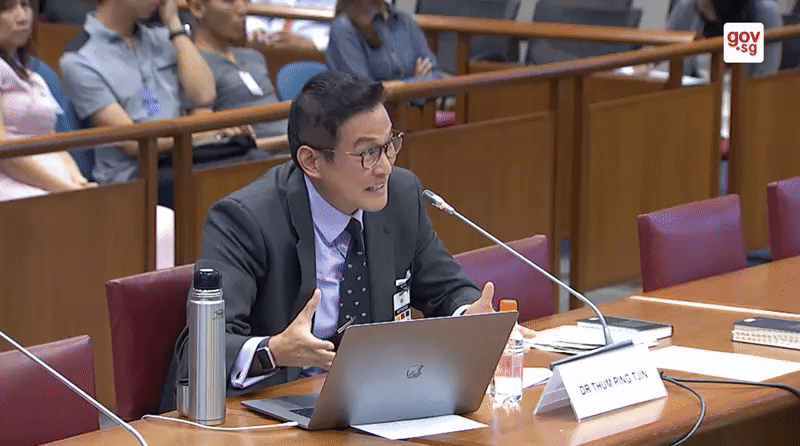 Source: Gov.sg.
Source: Gov.sg.
Excerpts of Exchange 2: Thum not being "perfect" in the subject he was supposed to be an expert in
Shamugam: Sitting there as a historian who has done detailed work in this area, you do not off the top of your head remember anything that suggests that Eu Chooi Yip and Chin Peng discussed and agreed to plan to sabotage the Malaysia plan?
Thum: No, not off the top of my head but I would be very grateful for the opportunity for you to refresh my memory.
Shanmugam: Alright, let's look at what Chin Peng says, at page 436 and 437... Over the page, let's look at the second paragraph: "Our Peking meeting also examined in detail the Malaysia plan that was being hatched between London and Kuala Lumpur. The three of us came to the conclusion that it would be in the best interests of our party, the communist party, if we plotted to sabotage this." So does that help you remember?
Thum: Yes, thank you.
Shanmugam: Thank you. It's quite surprising that something as important as this has escaped your memory.
Thum: Well, nobody is perfect.
Shanmugam: Thank you. Thank you. I don't for a minute suggest that you are completely perfect but I expected you to be more perfect than most of us in this field.
Thum: More perfect than most of us? Thank you, you have a very high opinion of me, so I'm very grateful for that. Thank you.
Shanmugam: Thank you. The reason for the high opinion is that you said you are someone who has done detailed research and work in this field, and I would have thought a plan by the Communist Party of Malaya to sabotage the Malaysia plan would have been something very significant that a historian will remember, but we will take it that you don't, and we will move on.
PJ Thum after 2 hours
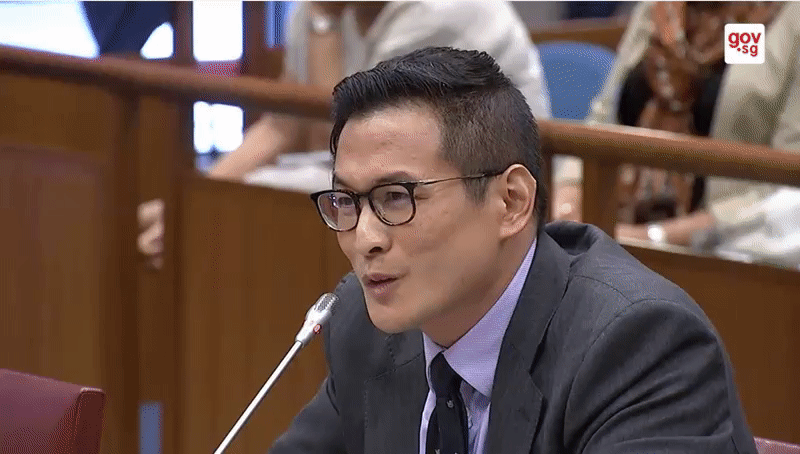 Source: Gov.sg YouTube.
Source: Gov.sg YouTube.
Excerpts of Exchange 3: Thum dismissed the views and impact of Chin Peng, the leader of the Malayan Communist
Shanmugam: Do you know whether Chin Peng decided to get the Singapore communist underground to work on splitting the PAP? Yes or no. I'm asking whether you know.
Thum: Let me think. I can't recall off the top of my head.
Shanmugam: You can't recall?
Thum: Yes, I can't recall.
Shanmugam: It's not an important enough fact in your mind?
Thum: Chin Peng is not a major player in Singapore because the MCP does not have a major presence in Singapore during this time.
Shanmugam: You didn't know that the cadres came down from Singapore. You keep making these statements.
Thum: Are we going to cite anything from the ISD, from special branch, because a lot of my work is based on their sources and their reports, and I do not recall anything in their documents saying that these 10 people out of over a million in Singapore had a major, major impact.
Shanmugam: The major impact we have dealt with and crossed the bridge, unless you want to re-cross again and say that what you said earlier is not true, so let's not go back to that.
Thum: We didn't connect those 10 people with the broader mass movement, we simply accepted that 10 people came to Singapore, according to Chin Peng.
Shamugam: I didn't say.
Thum: Thank you.
Shamugam: The point on the 10 people was the fact that you didn't know that happened and you didn't even register that. That's the only point. So it's not being suggested that there were only 10 communists in Singapore or that they all came from peninsula Malaya.
PJ Thum after 3 hours
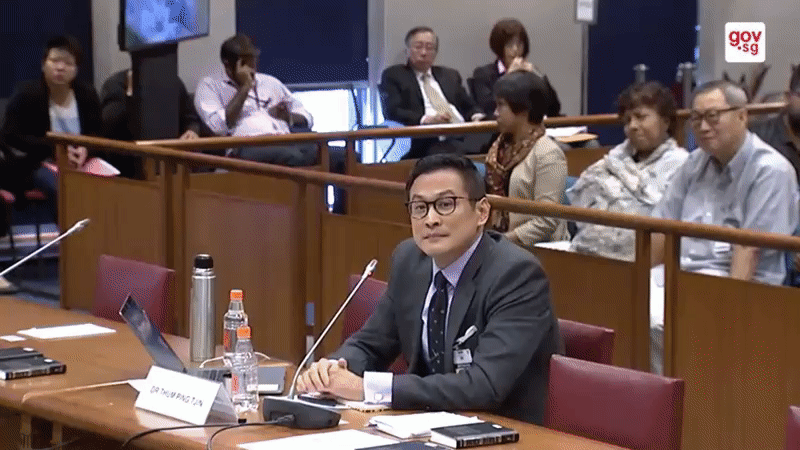 Source: Gov.sg YouTube.
Source: Gov.sg YouTube.
Excerpts of Exchange 4: Shamugam detailed how Thum disregarded evidence from leading communist leaders
Shanmugam: The statement that the historiography, academic work or body of academic work is clear on the lack of communism in the progressive left. That is your fundamental statement.
Thum: Yah, I'm going to stand by that, yes.
Shanmugam: In order to come to that statement, to make that statement, you have ignored order the the first-hand accounts of the secretary-general of the CPM.
Thum: And I have explained why.
Shanmugam: And you have ignored the evidence of Eu Chooi Yip, and Fong Chong Pik.
Thum: And I have explained why.
Shanmugam: As well as other ABL and CPM members, correct?
Thum: I have taken them into account, yes.
Shanmugam: Yes. It doesn't appear in any of the footnotes in your ARI paper, as far as I can tell it doesn't appear in other published works of yours.
Thum: Yes. They are in my thesis, though, the thesis is in the NUS library.
Shanmugam: I know, but when you make publication, when you put out publications, the fact that as a historian you set yourself out to make certain statements and you never explain anywhere, first, that these exists and second, why they ought not to be taken into account. Would you say it is a trifle odd?
Thum: No. You can't possibly account for every single source that ever existed anywhere in a published work of 10,000 words, including citations. You focus on making a coherent argument and proving your arguments. You don't prove negatives, you don't say, I disagree with this, this and that, you would spend thousands of word doing that. You make an argument about what you believe, based on the evidence that you have and you cite that evidence, and then other people of course come and disagree with you, you have a discussion.
Shanmugam: So that's your approach to history?
Thum: Yes, that's how I was trained.
Shanmugam: You will, if you find a source, various sources, CPM, secretary-general, others, because you disagree with them, you set them aside and you just rely on those that you think are relevant and you make your arguments? That's the approach you take?
Thum: And if people challenge me on that, as you have, I'm willing to explain why I set them aside. If you feel that it's absolutely necessary, I'm happy to provide a written account of why I set each and every one of these pieces aside.
Shanmugam: We know that some of them you haven't even read, you said that earlier.
Thum: I also know that you haven't shown me a single special branch document, which is the most coherent and largest archive of data.
Shanmugam: I'm not claiming to be a historian of repute, I'm not a historian, nor have I written on this period and I'm simply asking you questions on your writings.
Thum:Yes.
Shanmugam: Thank you.
PJ Thum after 4 hours
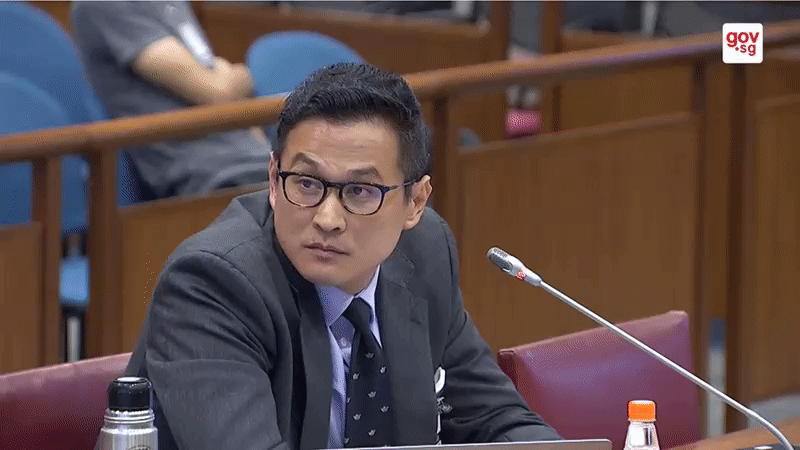 Source: Gov.sg YouTube.
Source: Gov.sg YouTube.
PJ Thum after 5 hours
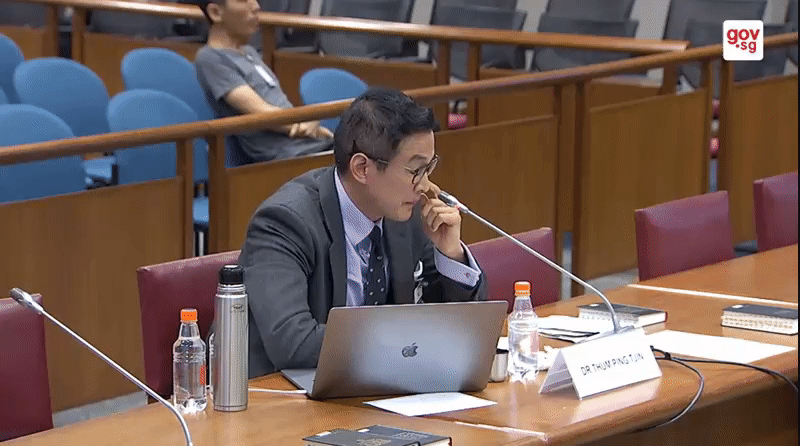 Source: Gov.sg YouTube.
Source: Gov.sg YouTube.
Excerpts of Exchange 5: Shanmugam used the example of a holocaust denier to ask whether Thum was being an objective historian
Shanmugam: Let's look at the standards of an objective historian, since you say you were trained in this way. You are aware of David Irving, the holocaust denier, correct?
Thum: Yes.
Shanmugam: You can see where this is going.
Thum: Yes.
Shanmugam: He sued Pengin books and others for defamation on the ground that they impugned his standing as a historian.
The case is Irvng v Pengin Books Ltd, in the year 2000 it was reported. Regius professor of modern history of Cambridge, Professor Richard Evans, gave evidence. He set out what he considered to be generally accepted standards of historical scholarship. I'm sure none of this will be news to you.
So he set out the following criteria: "Does Irving give a reasonably accurate account of the documents he uses? Does he translate them in a reasonably accurate and unbiased manner? Does he take into account as many other relevant documents as any professional historian could reasonably be expected to read? And cite when he is using one particular source to substantiate an argument? Does he apply consistent criteria of source criticism to all of the original material he use of? Examining it for its internal consistency, its consistency with other documents, its provenance, the motives for those who are responsible for it, and the audience for which it was intended? Are his arguments, his statistics and his accounts of historical events consistent across time and based on reliable historical evidence? Does he take into account the arguments and interpretations of other historians who have examined the same documents? Does he, in other words, advance his arguments and interpretations in a reasonably objective and unbiased manner?"
Would you accept that those are the standards of a competent historian? Expected of a competent historian?
Thum: Sure, yes.
Shanmugam: Thank you. The judge says, in his judgment: "an objective historian is obliged to be even-handed in his approach to historical evidence, he cannot pick and choose without adequate reason." So in the face of this, can I suggest to you that the fact that your historiography, you say there is no evidence, that's what you say in the ARI paper and you repeat that in multiple other places, you say there is no evidence of any communism in the progressive left, and in saying that you ignore the first-hand accounts of the secretary-general of the CPM.
Thum: And I have explained why.
Shanmugam: You ignore Eu Chooi Yip.
Thum: I have explained why.
Shanmugam: You ignore Fong Chong Pik and countless other ABL and CPM members. If you go back to what Professor Evans says, you may think them unreliable, but anyone reading your document would not even know they have said these things, because you say there is no evidence.
A proper competent historian would, when he makes such a sweeping statement, there is no evidence", will say, you know, the number 1 man in the organisation does say things which are contradicted by me but I disagree with him for this reason. I disagree with the number 1 man in Singapore, who was controlling 25 operations from Riau. I disagree with the number 1 man who was in Singapore directing operations and I disagree with all of them for these reasons." Then people can assess whether you are being accurate or not.
PJ Thum's last few moments during the hearings
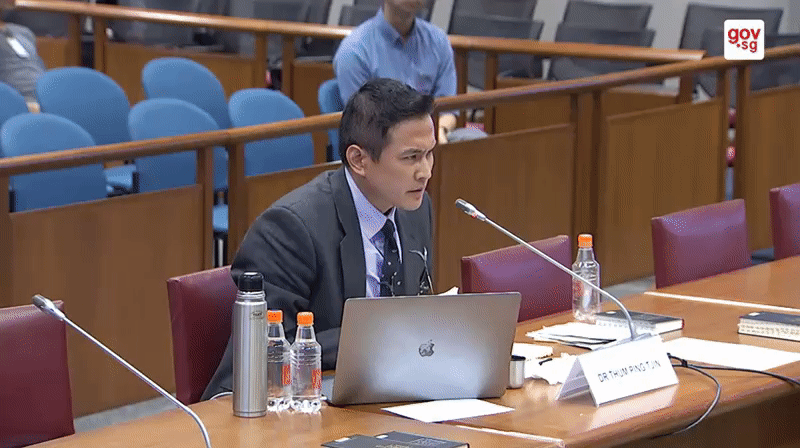 Source: Gov.sg YouTube.
Source: Gov.sg YouTube.
Excerpts of Exchange 6: Thum agreed to reword his statements on Lord Selkirk's views in the Dec 1962 telegram
Shanmugam: As a follow-up. Thank you. Now, let's look at your ARI paper. We have spent a huge amount of time looking at the two notes. Now let's look at your ARI paper, page 18. Your last paragraph: "Faced with this scenario, Barisan Socialis members were deeply frustrated ..."
You were good enough to agree that the last paragraph in page 19 looking at it again you should have reworded it. Equally, the way you have set out the references to the two notes, 23 September and 30 September, really ought to have been more accurate. Would you agree?
Thum: I would have reworded it. Yes.
Shanmugam: Thank you. And even the word "chose" Selkirk (the British Commissioner to Singapore) chose to interpret these as calls in the last paragraph of page 19, it should be reworded given that you agree that Selkirk's interpretation was accurate as regards this part, about what they agreed on.
Thum: We have already agreed that I would reword that sentence. Yes.
Shanmugam: Thank you. Can I suggest that going back -- these are central documents. These are the essential documents on which the Operation Coldstore was decided upon: the telegrams, the underlying notes, and of course this entire huge brick on open front, but we have had our discussions on open front. I am not going to reopen that. Based on what I quoted you from the Regius professor from Cambridge, can I suggest to you that you have pretty much breached a number of rules that he set out. Let's not argue about it. You can just disagree.
Thum: Yep, I disagree.
Shanmugam: I would say you have fallen through completely the standard of an objective historian. You can also disagree.
Thum: Disagree.
Shanmugam: Your views on communism, CUF in Singapore, Operation Coldstore, which you have been repeating at multiple fora are contradicted by the most reliable evidence. It ignores evidence which you don't like. You ignore and suppress what is inconvenient and in your writings you present quite an untrue picture. You can agree or disagree.
Thum: I disagree. Of course I disagree.
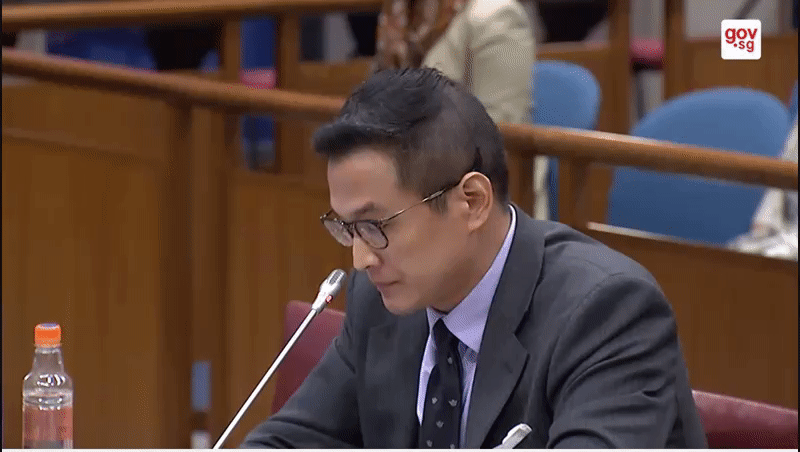 Source: Gov.sg YouTube.
Source: Gov.sg YouTube.
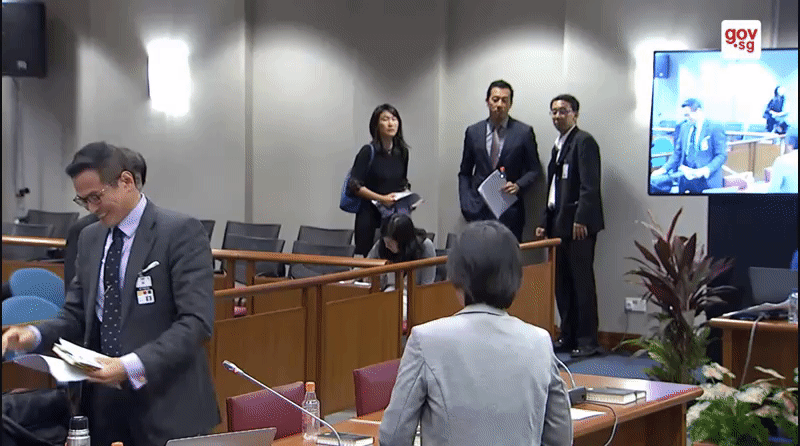 Source: Gov.sg YouTube.
Source: Gov.sg YouTube.
What conclusions can we draw from the exchange?
- The Select Committee got distracted by history. It spent nearly 10 per cent of its 50 hours of discussion on one subject and one topic.
- Through questioning, Thum made concessions to rephrase wordings from his 2013 research paper regarding Selkirk's views in the Dec 1962 telegram. He also admitted to not reading crucial accounts and documents of former communist leaders, especially if those accounts were in Mandarin.
- It is a national education exercise on Operation Coldstore. On Feb 2, 1963, hundreds of armed policemen arrested more than 100 leftist politicians and unionists and detained them without trial under the Preservation of Public Service Security Ordinance.
- Accounts on the exchange will be framed by Singaporeans who made the effort to at least know parts of the proceedings. But they will be largely dominated by political and social activists such as Thum himself and others.
[related_story]
Because the only time Singaporeans will think about the north of Singapore is a Johor shopping getaway this long weekend.
The end.
Top photo from here
If you like what you read, follow us on Facebook, Instagram, Twitter and Telegram to get the latest updates.
